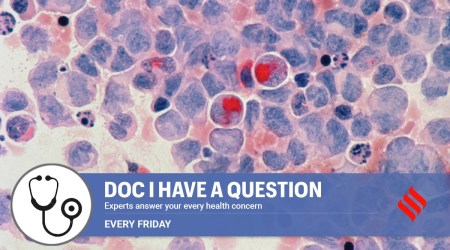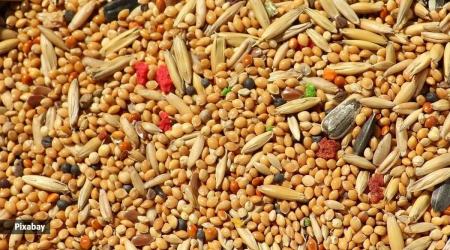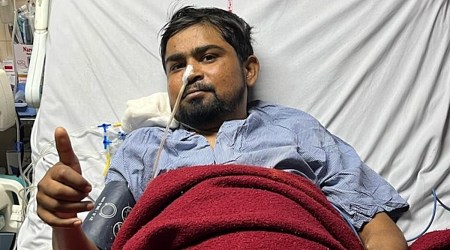HEALTH WELLNESS NEWS - Page 96
World Cancer Day: ‘I was vegetarian, ate right, still had colorectal cancer,’ says 49-year-old survivor, who sets up support group, is avid trekkerSubscriber Only
Previously thought to be a ‘Western’ disease, red meat and alcohol consumption being triggers, colorectal cancer is currently the fourth most common cancer in men and fifth among women in India, say oncologist
World Cancer Day: Why early detection and treatment can cure about one-third of all cancersSubscriber Only
Despite developments in cancer prevention, diagnosis and treatment, half of the world’s population do not get the full range of essential health services. Availability, accessibility, affordability are important factors that cause this gap in care, says Dr Sushmita Ghoshal, Professor and Head, Department of Radiotherapy, PGIMER
Union Budget 2023: Why are Centres of Excellence for R&D in pharmaceuticals significant?Subscriber Only
Industry experts decode the cascading impact of Budget announcement on skill development, innovation and indigenous development of medical devices
Vitamin D from the sun: Why exposing ourselves 10 minutes every morning or the first half of the day is still the best way to tackle deficiencySubscriber Only
A recent survey found that nearly 76 per cent or one in three Indians suffers from Vitamin D deficiency, mostly youngsters. That’s because we stay longer in a conditioned, indoor environment than the outdoors, says Dr Rommel Tickoo, Director, Internal Medicine, Max Super Speciality Hospital, Saket, New Delhi
Does soybean protein help lower cholesterol? How much should you include in your diet?Subscriber Only
Eating soy-based foods can reduce total cholesterol and slightly reduce LDL because they contain less saturated fat than meat and also provide other beneficial nutrients, such as good fats (monounsaturated fats), vitamins, minerals and fibre, says Dr Richa Chaturvedi, Senior Consultant, Endocrinology, Indraprastha Apollo Hospitals
Union Budget 2023: What are the challenges of meeting Sickle Cell Anaemia goals? Maharashtra shows the lag between promise and realitySubscriber Only
Lack of health infrastructure, medicines and specialists have not only crippled tribal patients but also pushed up mortality rates. A ground report
Union Budget 2023: Health budget is now Covid negativeSubscriber Only
The expanded mandate of comprehensive primary healthcare and the need to scale up the urban health component of the National Health Mission call for more funds, says epidemiologist Prof K Srinath Reddy
Union Budget 2023: What it means in facts and figures and why Govt still needs to increase allocation to health sectorSubscriber Only
The allocation for the health sector has effectively been reduced by around six per cent, in comparison to last year. Increased government spending is the only assured way to make health services affordable, says public health policy expert Dr Chandrakant Lahariya
Union Budget 2023: ‘Opening ICMR labs to medical colleges is a win-win for all and a big boost to medical research’Subscriber Only
Govt infrastructure can be fully utilised, smaller centres and start-ups will benefit, public-private partnership will accelerate R&D and help in comprehensive public health management post-Covid, say experts
Union Budget 2023: FM calls millets Maa Anna. So what are their health benefits and why they can be a cheap stapleSubscriber Only
Millets can be stored for long periods and have short growth cycles, so there is no reason why they should be more expensive than widely used staples. Be careful about processing as it usually removes the fibre, which lowers the glycemic index (GI) of millets. Also limit your portions, says Dr Ambrish Mithal, Chairman and Head, Endocrinology and Diabetes, Max Healthcare
Union Budget 2023: Govt announces 157 nursing colleges but what does that mean? Jobs, just wages or teachers remain challengesSubscriber Only
'The minimum wages decided by the Delhi High Court are not being paid at both private and public hospitals. So nurses are quitting, going abroad, leaving one person for 40 beds,' says Leeladhar Ramchandani, general secretary of the Delhi Nursing Federation.
Union Budget 2023: Why multidisciplinary courses on medical devices will not work if we continue to encourage Chinese imports, disincentivise local playersSubscriber Only
‘Sadly, the government didn’t even implement the recommendations made by the parliamentary committee on health. It is very painful to see domestic industry players shutting shop as the local industry cannot compete with cheaper Chinese imports,’ says Rajiv Nath, forum coordinator at the Association of Indian Medical Device Industry (AIMED)
Union Budget 2023: What is Sickle Cell anaemia? Pioneer ICMR researcher says how the target can be metSubscriber Only
Prof S L Kate, 91, who has done pioneering research in Sickle Cell anaemia, says rarely do diseases of the poor get prioritised. He is also conducting clinical drug trials on tribal patients.
Union Budget 2023: What are the key takeaways for the health sector?Subscriber Only
Big push for millets, public-private partnership in R&D and an ambitious target to eliminate sickle cell anaemia by 2047
What ups diabetes risk? Processed foods like instant noodles, energy bars and drinks harm your bodySubscriber Only
Apart from being high in calories, salt and sugar, these foods contain harmful additives and newly-formed compounds. The packaging may contain chemicals, which are known as hormone disruptors, says Dr Anoop Misra, Chairman, Fortis CDOC Hospital for Diabetes and Allied Sciences
Know how eating high fat and high calorie foods can rewire your brain to eat for pleasure, cause obesitySubscriber Only
Researchers from Penn State College of Medicine, US, found that after being continuously fed a high fat/high calorie diet, the brain adapts to what is being ingested and forgets to balance calorie intake. The study proves junk foods are endocrine disruptors, say experts
Why you need to warm up before your workouts and gym routine. How should you gear up?Subscriber Only
Warm-ups gradually start a slow combustion, allow your muscles to peak, stretch and contract optimally. They increase your heart rate, blood flow and enable more oxygen to reach your muscles, says holistic health expert Dr Mickey Mehta
Kidney from sister, pancreas from deceased donor: PGI Chandigarh saves Type 1 diabetes patient with first such simultaneous organ transplantSubscriber Only
Pancreas transplant is the only modality known to treat severe cases. Currently, the patient is maintaining a good urine output with normal blood sugar, say doctors
Exercise after a heart attack: Is it safe? What are the benefits?Subscriber Only
Once corrective action has been taken regarding blockages and whatever was obstructing the pumping efficiency of the heart, the patient can get back to his routines. In fact, these strengthen the heart and speed up recovery. But work through a cardiac rehabilitation programme, take the stress tests and go by the advice of your cardiologist, says Dr Balbir Singh, Chairman, Cardiac Sciences, Cardiology, Cardiac, Electrophysiology-Pacemaker, Max Hospital
Can dates help diabetics lower blood sugar? Know how much, which variety and ripeness suits youSubscriber Only
Put together by Dr Anoop Misra, Chairman, Fortis CDOC Hospital for Diabetes and Allied Sciences, and Dr Meenakshi Bajaj, dietician, Tamil Nadu Government Multi-Super Speciality Hospital, Chennai, a review of several studies shows how dates, had the right way, can impact blood glucose, glycosylated haemoglobin, lipid profile and body weight
How to snap out of your lows in the middle of a busy workdaySubscriber Only
Sometimes a distraction alone may not work and you may need to give yourself a quick reminder by asking the right questions. Raise questions like ‘How much can it really change the trajectory of my life?’ A quick guide by Dr Kamna Chhiber, Clinical Psychologist, Head, Mental Health, Dept of Mental Health and Behavioural Sciences, Fortis Healthcare
Intermittent fasting vs calorie restriction: Which one can help you in weight loss, lowering cholesterol?Subscriber Only
A new study says so. One should aim for three to five smaller meals per day, rather than two to three larger meals. This can help regulate blood sugar levels, reduce hunger and promote a sense of fullness, says Ushakiran Sisodia, Clinical Nutritionist and Head, Dietary Department, Nanavati Max Hospital
Are makhanas good for a low carb and high protein diet?Subscriber Only
Their glycemic index is below 55, lower than known carbohydrates like rice, wheat and refined flour. This means the blood glucose levels won’t rise immediately and no extra levels would be floating in your bloodstream. Besides their high protein and fibre content slows down hunger frequency, says Dr Charu Dua, Chief Clinical Nutritionist, Amrita Hospital, Faridabad
30 tabs daily, hallucinations, 50 per cent chance to live: How Kunal, 26, fought multidrug-resistant TBSubscriber Only
Mumbaikar Kunal Thakkar recounts his two-year journey of taking 30 tablets a day, living through extreme pain, hallucination, depression and finally running a YouTube channel. All with a little help from the BMC
NIMHANS develops workplace stress test: Why you need to take it for your heart healthSubscriber Only
NIMHANS researchers develop a tool to map the mental health of employees and help companies ease the work environment. 'Measuring stress is important because long-term stress has been linked to an increased risk of heart diseases and other non-communicable diseases,' says Dr Gautham M S, additional professor in the department of epidemiology.
BEST OF EXPRESS





Must Read















































